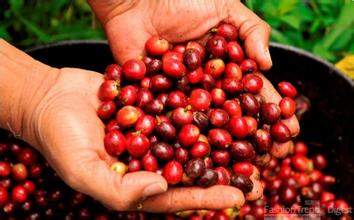Introduction to the flavor description of the varieties produced by the coffee farm in Arusha, Tanzania
After drinking Tanzanian coffee, you will always feel a soft and mellow earthy taste at the corner of your mouth. Coffee gourmets often use words such as "wild" or "wild" to describe it. It can be said that pure Tanzanian coffee is "the most African coffee".
Usually its acidity is mild, after eating evenly stimulate the middle and both sides of the tongue taste buds, feel a bit like tomato or soda acid. After moderate or moderate baking, there is a strong aroma, and then ground into fine powder, add boiling water on a pot, call friends around to taste, suddenly feel fragrant overflowing, mouth fluid.
Tanzania's coffee exports occupy an important position in the overall national economy. In the past, Tanzania's coffee industry has been dominated by plantation cultivation, but now more than 85% is cultivated by smallholders. Many small farmers form cooperative organizations, the most important of which is the Kilimanjaro Cooperative Union (KNCU). Tanzanian coffee is sold at auction by the Tanzanian Coffee Marketing Board (TCMB) to private exporters. In the 1980s, most coffee sales in Tanzania shifted from auctions to direct sales to the Tanzania Coffee Marketing Board.
This has changed, and the coffee industry is being reformed to allow individuals or groups to buy coffee in the future, and coffee will be graded in different ways to attract buyers from Germany, Finland, the Netherlands, Belgium and Japan
Tanzania's coffee beans are of exceptional quality. They are grown in the Moshi region near Mount Kilimanjaro. The mountain areas between 3,000 and 6,000 feet high are the best places to grow coffee. Fertile volcanic ash gives the coffee a strong texture and soft acidity. It exudes a delicate fragrance, and contains wine and fruit aromas, aftertaste is endless. After drinking Tanzanian coffee, you will always feel a soft and mellow earthy taste at the corner of your mouth. Coffee gourmets often use words such as "wild" or "wild" to describe it. It can be said that pure Tanzanian coffee is "the most African coffee". Tanzania AA is the highest level of beans, its full particles, pure flavor, rich and refreshing, all aspects of quality are first-class. Usually its acidity is mild and evenly stimulates the taste buds in the middle and sides of the back of the tongue, feeling a bit like the sourness of tomatoes or soda. After moderate or moderate baking, there is a strong aroma, and then ground into fine powder, add boiling water on a pot, call friends around to taste, suddenly feel aromatic overflowing
Most Tanzanian beans are grown in Mr. Kilimanjaro and Mt. Meru near the northern Kenyan border. The coffee-growing area around Meru is usually called "Krimanjaro" and occasionally named after Moshi or Arusha. On the south side of the border, a little washed arabica beans are also produced, named after the nearby city of Mbeya or the distribution center of Pare. The classification is similar to Kenya, with English letters distinguishing sizes. Most Tanzanian beans have typical African bean characteristics. The better crimenjaro is similar to regular Kenya, has a thick texture, is usually milder in acidity than Kenya, and evenly stimulates the middle and lateral taste buds at the back of the tongue. It tastes a bit like a tomato or soda. As for the southern beans, they are comparable to the second-grade washed mocha, with a soft and pleasing weak acid, a round taste, and a medium texture. Beans grown in neighbouring Malawi also have qualities similar to those of Tanzanian beans

Important Notice :
前街咖啡 FrontStreet Coffee has moved to new addredd:
FrontStreet Coffee Address: 315,Donghua East Road,GuangZhou
Tel:020 38364473
- Prev

Costa Rica Phoenix Estate Coffee Bean Flavor Description Grind Scale Variety Introduction
Other types of Brazilian coffee, such as Rio, Parana, etc., can be produced in large quantities without too much care. Although the taste is rough, it is a kind of inexpensive coffee. Because it is distributed all over the country, the solid quality varies, and there are its own standards (NO.2~NO.8 according to the amount of impurities, NO.13~NO.19 according to the size of beans, divided into six grades according to taste).
- Next

Introduction to the regional flavor of coffee bean grinding scale production in Kimmel Manor, Rwanda with a long aftertaste
Bourbon coffee grown in Rwanda is one of the original varieties of Arabica coffee. In the annual professional evaluation of the top coffee held by the American Fine Coffee Association SCAA in 2008, Rwanda Aromec of Rwanda was the best washed bourbon, which beat the Blue Mountain No.1 of Jamaica and Mantenin G1 of Sumatra and won the 2008 champion C.
Related
- Does Rose Summer choose Blue, Green or Red? Detailed explanation of Rose Summer Coffee plots and Classification in Panamanian Jade Manor
- What is the difference between the origin, producing area, processing plant, cooperative and manor of coffee beans?
- How fine does the espresso powder fit? how to grind the espresso?
- Sca coffee roasting degree color card coffee roasting degree 8 roasting color values what do you mean?
- The practice of lattes: how to make lattes at home
- Introduction to Indonesian Fine Coffee beans-- Java Coffee producing area of Indonesian Arabica Coffee
- How much will the flavor of light and medium roasted rose summer be expressed? What baking level is rose summer suitable for?
- Introduction to the characteristics of washing, sun-drying or wet-planing coffee commonly used in Mantenin, Indonesia
- Price characteristics of Arabica Coffee Bean Starbucks introduction to Manning Coffee Bean Taste producing area Variety Manor
- What is the authentic Yega flavor? What are the flavor characteristics of the really excellent Yejasuffi coffee beans?

